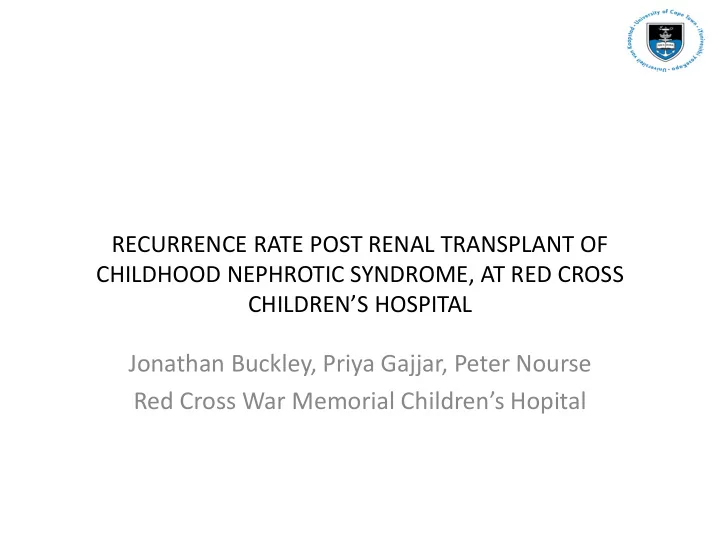

RECURRENCE RATE POST RENAL TRANSPLANT OF CHILDHOOD NEPHROTIC SYNDROME, AT RED CROSS CHILDREN’S HOSPITAL Jonathan Buckley, Priya Gajjar, Peter Nourse Red Cross War Memorial Children’s Hopital
Introduction • Nephrotic syndrome (NS) is recognized cause of ESRD • The definitive treatment option in ESRD is renal transplantation • But many types of NS reoccur in the graft kidney • FSGS especially has a recurrence of 20-40% 1 • Internationally, certain predisposing factors have been identified 2 • Little has been published on the characteristics and recurrence of NS in an African setting ( 1 Tejani et al, 1992) ( 2 Ponticelli et al, 2010)
Aim • To describe the characteristics of the patients with NS who were transplanted at Red Cross Children’s Hospital • To determine the recurrence rate of NS in the graft kidney post renal transplant
Methods • This was a retrospective descriptive study • The medical records of all patients with nephrotic syndrome, who received a renal transplant at Red Cross Children’s Hospital from 1996 to 2012, were reviewed
Results • 148 renal transplants at RXH from 1996-2012 • Average of 9.25 transplants per year • 28 (18.7%) had NS • Only 19 complete records could be found
Characteristics • Mean age at presentation with NS: 5yrs (Range 1-14yrs) • Mean age at transplant: 10yrs (Range 3-15yrs) • Male to female ratio 11:8 • 47% were Black African • 47% were Mixed Race • 6% were Caucasian
Histiological subtypes 3 (11%) 2 (7%) FSGS MCGN 16 (57%) MPGN 7 (25%) CN
Steroid responsiveness • 5 patients were initially responsive to steroids • 14 patients were steroid resistant at presentation
Donor type • 4 patients received grafts from living related donors • 14 patients received grafts from cadaver donors • 1 patient received a graft from a living non related donor
Induction therapy • 9 patients received induction therapy • 4 patients did not • In 5 patients the records were not complete
Time from presentation to ESRF • Progression to ESRF within 3yrs of presentation has been shown to be a risk factor for recurrence • 8 patients developed ESRF within 3 yrs of presentaion • 11 patients did not
Outcomes • 8 patients lost their grafts • The 1 year graft survival rate was 89% • The 5 year graft survival rate was 50% • 5 patients died • 7 patients have been successfully transitioned
Recurrence rate 30 7 % 25 20 12,5% 15 10 5 0 Total recurrence rate FSGS recurrence rate
FSGS patients characteristics • Both presented between 6-15yrs of age (9 and 14yrs respectively) • Both had induction therapy at transplant • Neither was Caucasian • Neither developed ESRD within 3yrs of presentation
cont. • In both cases the donors were young (18 and 32yrs) • The graft kidneys were from deceased donors • Only one patient had nephrectomies • One patient had a biopsy showing no mesangial proliferation
Conclusion • FSGS was the most common histological type of NS, leading to renal transplantation • Our recurrence rate of 12,5%, in our small group of FSGS patients, is low • A possible explanation is that this is a single center study, and that the spectrum of the NS, we see is different • Due to the small sample size no statistical inference could be made with regards to possible predisposing factors
Future suggestions • National paediatric transplant registry • Bigger sample size- better data • Able to calculate national recurrence rate • Determine what predisposing factors may lead to reoccurrence • Therefore offer a better service to our patients and ensure that valuable resources are use appropriately
Thanks • SCAH and UCT • Red Cross Children’s Hospital • Drs Peter Nourse and Priya Gajjar • Prof Mignon McColluch • OUR PATIENTS- WHO TEACH US NEW LESSONS EVERDAY!
QUESTIONS:
Recommend
More recommend